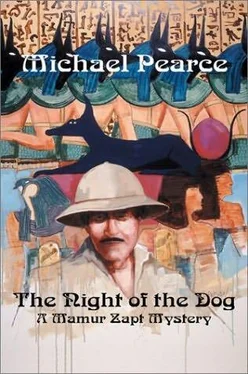Michael Pearce - The Mamur Zapt and the Night of the Dog
Здесь есть возможность читать онлайн «Michael Pearce - The Mamur Zapt and the Night of the Dog» — ознакомительный отрывок электронной книги совершенно бесплатно, а после прочтения отрывка купить полную версию. В некоторых случаях можно слушать аудио, скачать через торрент в формате fb2 и присутствует краткое содержание. Жанр: Исторический детектив, на английском языке. Описание произведения, (предисловие) а так же отзывы посетителей доступны на портале библиотеки ЛибКат.
- Название:The Mamur Zapt and the Night of the Dog
- Автор:
- Жанр:
- Год:неизвестен
- ISBN:нет данных
- Рейтинг книги:3 / 5. Голосов: 1
-
Избранное:Добавить в избранное
- Отзывы:
-
Ваша оценка:
- 60
- 1
- 2
- 3
- 4
- 5
The Mamur Zapt and the Night of the Dog: краткое содержание, описание и аннотация
Предлагаем к чтению аннотацию, описание, краткое содержание или предисловие (зависит от того, что написал сам автор книги «The Mamur Zapt and the Night of the Dog»). Если вы не нашли необходимую информацию о книге — напишите в комментариях, мы постараемся отыскать её.
The Mamur Zapt and the Night of the Dog — читать онлайн ознакомительный отрывок
Ниже представлен текст книги, разбитый по страницам. Система сохранения места последней прочитанной страницы, позволяет с удобством читать онлайн бесплатно книгу «The Mamur Zapt and the Night of the Dog», без необходимости каждый раз заново искать на чём Вы остановились. Поставьте закладку, и сможете в любой момент перейти на страницу, на которой закончили чтение.
Интервал:
Закладка:
“It all comes from Osman, does it?” asked Owen.
“Yes, Osman and Andrus. They’re the two.”
“They’re the one if it all comes back to Andrus.”
Georgiades went to the door and called for Yussuf. One of the other bearers shouted back encouragingly. In Yussuf’s present numb state they had taken to covering for him.
Owen sat there thinking. He couldn’t make any sense of it. The premise that everything started from was Andrus’s hostility to anything Moslem. It had been there right from the beginning, right from the night of the dog. It ran through everything. It had never wavered. He could not believe that it was wavering now. But how else to explain his actions? The money was definitely being brought to Mordecai; and Mordecai was definitely passing it on to Osman. Not only that; Mordecai was equally definite that he was merely doing as he had been instructed. And Owen believed him.
Andrus was part of it. About that there could be no doubt. But how extensive a part? Might Nikos be right and Andrus merely an unwitting accomplice, ignorant of for whom the money was intended? But then, Nikos was himself a Copt and, yes, under an obligation to Andrus; might not he be biased in Andrus’s favour? And then again, for all his brilliance at organization, Nikos sometimes overdid the speculation.
“Try another idea,” said Nikos. “Why don’t you apply the analysis you made of the Moslems to the Copts?”
“What analysis?”
“The political connection. You know, that there was a group of people at the top, ministers, perhaps, who had an interest in keeping relations between Copts and Moslems on the boil. You thought that might lie behind Mahmoud being brought back into the Zoser case. Keep the wound open. Copts against Moslems. I liked that analysis. It avoided the mistake that is so often made. People assume, the British especially, who appear to have a unique talent for combining sentimentality and intellectual evasion, that conflict, even massacre, is in no one’s interest. But they’re wrong. Sometimes it is in someone’s interest. And then if you want to find out the reason for the tension or how to stop it, what you have to do is look at the interests of those concerned. Perhaps the mistake we have been making is in applying that thinking to the Moslems but not to the Copts.”
Owen reached out his hand for the coffee a bearer had just brought in. A different bearer. Not Yussuf.
“Applying it, then, to the Copts,” said Owen, “what do we get?”
“Someone on the Coptic side wants to keep things on the boil, wants to stop agreement from being reached. To do that, they’re even prepared to give money to Moslems.”
“To be used against Copts?”
“All the more effective,” said Nikos, “if you wanted to keep things on the boil.”
Georgiades put his mug back on the tray.
“Someone’s a clever bastard,” he said. “Of course, it may just be you.”
“It fits,” said Owen. “It explains the money.”
“Not only that.”
“Yes,” said Owen. “It explains Andrus too.”
One of the bearers rushed into the office.
“Effendi! Come quickly. Yussuf has taken a knife!”
Owen ran down the corridor and into the bearers’ room. There were shocked faces everywhere but no Yussuf.
“Where is he?”
“He ran out, effendi. He said he would kill them.”
“Who?”
“Suleiman, effendi. And Fatima.”
One of the bearers plucked at his arm.
“He took my knife, effendi. He took my knife.”
“Where is Suleiman’s house?”
It was in the bazaar area.
“Take me there.”
The man ran out with Owen on his heels. Two of the other bearers followed.
From the Bab el-Khalkh to the Bab es Zuweyla was about half a mile. A man would go faster than an arabeah, certainly if you took into account the time needed to explain it to the arabeah driver. The bearer set off along the wide, dusty street. He was one of the younger bearers and ran fast. Owen found it hard to keep up with him. Within a minute the sweat was pouring off him and his jacket sticking to his back.
The bearer slowed to let him come up with him.
“Run on!” said Owen. “Fast.”
This was how they could save time, catch up. Once they were through the Gate they wouldn’t be able to run at all. The streets would be too crowded.
The bearer drew away again. He was running barefoot and had the advantage over Owen in his heavy shoes. By the time they had reached the Gate he was a dozen or more yards ahead.
Owen dashed up almost blinded with sweat.
“On! Get on!” he managed to gasp.
The bearer plunged at once into the warren of tiny streets, alleyways and passages between stalls that made up the area loosely known as the bazaars. Every road, every lane, even the narrowest of alleys was taken up with stalls. And wherever there was a stall, inevitably the passage was blocked by the wares which spread out from it, covering the ground on all sides, stretching right across the thoroughfare so that there was indeed no thoroughfare but you had to pick your way among pots and pans, saddles, boots, baskets, melons, bales of cloth, onions, and canvases appliqued with texts from the Koran and crude copies of the tomb-paintings of the pharaohs.
And wherever there was a suggestion of a space there would be a craftsman bent over his work: a weaver over his loom, a metal-worker crouched over a dish of grey ash fanning a lump of live charcoal in its midst with a blowpipe, a basket-worker holding what he was making with his toes so as to leave his hands free, a turner doing his turning with a little bow which might have been used to shoot arrows, the man making pegs for the ornate wooden windows.
Owen was in despair. Not only could he find no space to put even one foot, but whenever he hesitated, hands reached up at him beckoning him to buy. He slowed almost to a halt.
The bearer kept looking back at him. Owen would have told the man to run on but without him he would have been lost at once. What had happened to the two other bearers who had started out with them he did not know.
The bearer pulled him into a passage so thin that even the narrowest of stalls could not wedge itself in. There was barely space for a person to pass. Halfway along they met a woman. She pushed herself back against the wall to avoid touching a man but as Owen pressed past her he was as conscious of her roundnesses and softnesses as if he had been in bed beside her.
They came out into a slightly wider passage where there were no stalls but children were playing and black-gowned women standing in doorways talking. They looked up at him in surprise and pulled their veils back across their faces. One or two snatched up their children and held them close, making signs to warn off the evil eye. This was mediaeval Cairo, mediaeval still.
They went up another narrow passageway, not so much a passage as a mere slit between houses, and came out suddenly into open space. After the darkness and coolness the light and heat struck him like a blow.
The bearer looked round. Everywhere was rubble. There wasn’t a single building standing for hundreds of yards. The ground was covered with crumbling mud-bricks, heaps of cracked white stone. A dog barked and was answered by another. Out in the rubble he saw others skulking.
Then he realized where they were: the Coptic Place of the Dead.
The bearer turned left along a line of houses they had just come out of. The big ones they had passed through gave way to smaller, two-storey ones built of mud-brick which the rains were gradually dissolving. Everything was crumbling, falling down. Here and there were gaps in the line where houses had collapsed completely.
There was a piercing whistle and a little boy ran across the rubble towards them.
Читать дальшеИнтервал:
Закладка:
Похожие книги на «The Mamur Zapt and the Night of the Dog»
Представляем Вашему вниманию похожие книги на «The Mamur Zapt and the Night of the Dog» списком для выбора. Мы отобрали схожую по названию и смыслу литературу в надежде предоставить читателям больше вариантов отыскать новые, интересные, ещё непрочитанные произведения.
Обсуждение, отзывы о книге «The Mamur Zapt and the Night of the Dog» и просто собственные мнения читателей. Оставьте ваши комментарии, напишите, что Вы думаете о произведении, его смысле или главных героях. Укажите что конкретно понравилось, а что нет, и почему Вы так считаете.












